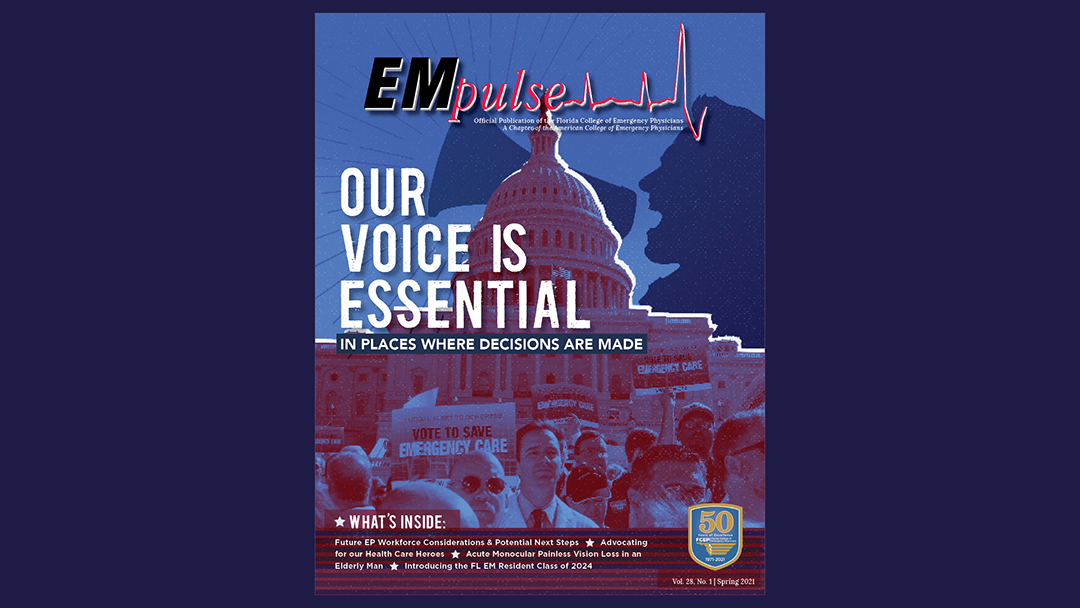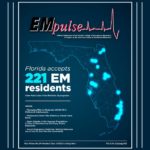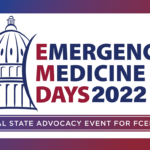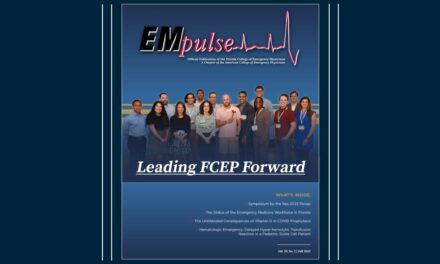Spring 2021: Government Affairs: Legislative Session 2021
Greetings, and I hope this update finds you well. Emergency Medicine Days 2021 was held virtually this year on April 8-9, 2021, but this remix did not stop us from having a productive and successful Legislative Session.
Session ended on Friday, April 30, and Governor Ron DeSantis has a 15-day window to sign or veto the bills that were successfully passed through the State Legislature. Here is an update on where our priority issues stand:
1) Personal Injury Protection (PIP) Repeal – PASSED
In the closing hours of Session, the House and Senate signed off on SB 54: Motor Vehicle Insurance, which will repeal Florida’s no-fault personal injury protection (PIP) system and replace it with bodily insurance (BI) coverage in January 2022 if signed into law by Gov. DeSantis.
The PIP system assures prompt payment to emergency physicians who provided mandatory care for injured motorists, and especially uninsured motorists. As such, any change in coverage should preserve first dollar coverage for the care we provide. FCEP worked to ensure that the 2.8 million Floridians without proof of health insurance will be required to purchase or opt-out of Medical Payments coverage, and that the $5,000 physician set-aside would be retained, which is key to assuring liens do not give hospitals priority access to Medical Payment funds.
We succeeded: The final bill mandates Med Pay at both $5,000 and $10,000, with an opt-out in writing. Without an opt-out in writing, the policy reverts to the $10K med pay. Med pay has a $5K 30-day, physician set-aside for emergency care and inpatient care.
2) Covid-19 Liability Protections for Healthcare Providers – SIGNED INTO LAW
In the first part of the legislative session, much of the focus was on bills related to the thing our whole world has centered around the past year: the pandemic. Through a lot of hard work and meetings with legislators and their staff, we witnessed the successful passing of COVID-19 liability protections for healthcare workers. While many states passed protections against malpractice lawsuits related to COVID-19 early on in the pandemic last year, Florida was one of the holdouts since the legislative session had come to an end and the Governor chose not to take executive action. Thankfully, this has been corrected with passage in both houses and a signature by Governor DeSantis in March.
3) Scope of Practice Expansion for Advanced Practice Providers – PASSED
FCEP continues to use every fact and resource to oppose unwarranted, unnecessary and unsafe scope of practice expansions. When SB 894: Physician Assistants started off granting PA’s autonomous practice, FCEP and the physician community went to work. Through negotiations and compromise, an amendment removed the autonomous practice language in favor of an “unlimited cap” on the number of PA’s a physician can supervise, before finally settling on the amendment that ultimately passed, which raises the maximum number of PA’s a physician can supervise from four to 10. FCEP fought hard within the physician community to cap this number at six instead of 10 – especially since physicians remain liable for all care provided by their PA’s – but unfortunately, the majority overruled.
Gov. DeSantis has not signed the bill into law yet, and we encourage him not to. Before any more scope of practice expansion bills pass, it is prudent for legislators to evaluate last year’s law based on the intent and promises made, as well as the impact to healthcare.
- What has the new NP law accomplished? If the goal was to increase access to primary care, did that actually occur?
- If expansion of primary care into rural areas was the intent, are we seeing that outreach? Or are autonomous NPs expanding in wealthy areas, suggesting the push was for NP use in cosmetic clinics and/or independent practice?
- What consideration is being given to the hospital quality of care and physician workforce issues brought about by these changes and the global pandemic?
- What metrics have been or will be established for patient safety, quality and outcomes related to NP or PA expansion goals?
We look forward to hearing the answers to these questions in the next Session, where we anticipate scope of practice expansion bills to make another comeback. If you have any data to provide on this important issue, please contact FCEP now.
4) Pelvic Consent Law – PASSED
Last year, a bill was passed requiring written consent in lieu of verbal consent for pelvic examinations. Over the summer, FCEP worked with coalition partners to address some deep concerns with the implementation of this bill.
We asked for a clarification of terms: The language used in the 2020 bill did not align with prior statute and created confusion. The pelvic exam language should track back to s. 395.002(9), which defines emergency treatment and care.
We asked for a general consent form to help avoid delays in care: Getting verbal consent in the ED gave practitioners the opportunity to provide real-time reassurance and education through “casual” conversation. The written consent process puts a halt to the traditional physician/patient medical exam by forcing the practitioner to stop and bring in non-clinician staff with additional forms. A single, general consent specifying that a pelvic may or will be performed should be used as opposed to requiring a separate, unique process for the pelvic examination.
We succeeded, and the new bill:
- Amends, narrows, and simplifies the definition of “pelvic examination”;
- Amends current law requiring written consent for all pelvic examinations performed by health care practitioners and trainees to require written consent for anesthetized or unconscious patients and to require verbal consent from any conscious patient, with exceptions;
- Modifies the current exception allowing an examination to avert a serious risk of bodily impairment to simply refer to the statute on emergency services and care;
- Adds three new exceptions, thereby allowing an examination without consent, related to emergency medical conditions, a child protective investigation, and certain criminal offenses against a child; and
- Provides that a single written consent for a pelvic examination may authorize multiple health care practitioners or students to perform a pelvic examination on a pregnant woman having contractions.
5) “Support Healthcare Heroes” License Plate
Florida has 99 specialty license plates, but none of them honor healthcare workers. We figured there was no better time than during a pandemic to push for a specialty license plate of our own that says: “Support Healthcare Heroes.” All funds raised from this plate (est. $250K annually) will be allocated to the Florida DOH Emergency Medical Services Trust Fund, which provides financial support for EMS and is dwindling due to a steady decline in its current funding source — traffic violation tickets.
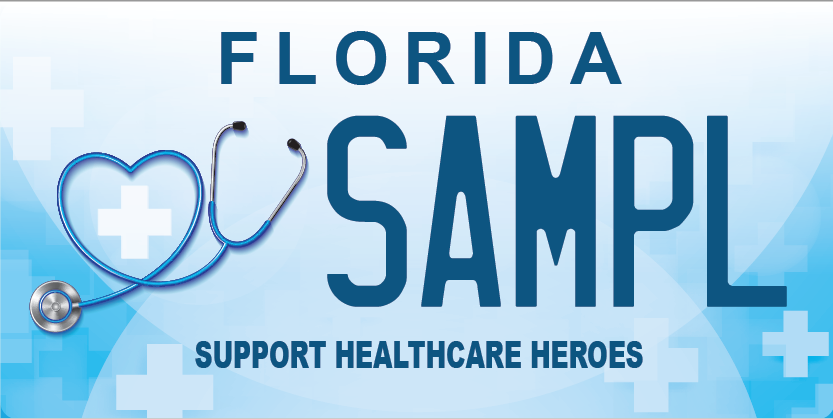
We succeeded: FCEP worked with Sen. Gayle Harrell to promote the legislative language that was included in a larger transportation bill. Many specialty license plates were introduced this Session, and as a result, most of them — including ours — were stripped from the SB 676: Specialty License Plates bill by the House on the last Monday of Session. Thankfully, our lobbyist, Toni Large, worked to get our Healthcare Heroes License Plate back into the bill on Wednesday. On Thursday, April 29, the bill authorizing seven new specialty license plates was passed and awaits Gov. DeSantis’s signature.
The work doesn’t stop there, though: At least 3,000 pre-sale vouchers must be sold within 24 months after vouchers become available in order to manufacture the plate. We are confident, however, that we can reach this threshold.
6) Teeing up for 2022 Session: MAXIMUS and the Independent Dispute Resolution (IDR) Process
FCEP sought bill sponsors for an IDR fix that would require insurers to participate in the IDR process (through MAXIMUS) this session. Unfortunately, we discovered that our simple fix is not so simple without an agency or court opinion supporting our case. We continue to make the case to AHCA & OIR, and you can help us do that by sharing your payment dispute experiences with FCEP and ACEP.
This will be a 2022 legislative priority. We encourage our physicians to utilize the IDR / MAXIMUS process and even take an “opt out” case to court in order to clarify the law.
Help Us Reach Our Goals
When I first started to get involved in advocacy, a mentor explained to me that in order to get anything accomplished with politicians, you must have two resources: time and money. We use the latter to secure in-person time and events with elected officials or their staff.
Please consider donating to the FCEP PAC. Without your help, we cannot be there to represent you in those Tallahassee offices. We are happy to give our time to meet with the legislators, if you give us the chance to get our feet in the door.
This article is part of the following sections:


